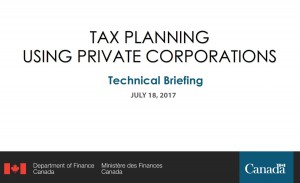On July 18, the Federal Government’s Department of Finance released a 63 page proposal on potential tax legislation reform directed at Small Businesses (who utilize a corporation to run their business). The full proposal can be found here: Tax Planning Using Private Corporations. The general public has until October 2nd to provide comments, analysis and changes to the proposal and as a Practitioner who works with small business owners daily, I will be responding to provide my thoughts, insights and alternate recommendations to those provided in the proposal that paints all Small Business Owners and Entrepreneurs as “tax cheats”.
The individuals that I work with on a daily basis are hard working folks that take pride in the products and services they provide to the Community as well as ensuring their employees and team members are employed. Small Business is the backbone of the economy of a community such as St. Stephen and other small to medium sized communities across Canada and this Proposal, in my opinion, will have a negative affect on Small Businesses.
The contents of this Proposal affect everyone in a Community such as St. Stephen. It not only affects the Small Business Owners who are directly affected, it trickles down to their employees, their clients and customers, their suppliers and the residences of the Community in which they live.
So why am I so wound up?
I am not going to spend the rest of this blog on the deep technical aspects of the proposal, however, I will highlight the three issues and what it means to a Small Business Owner, so you can get a sense of the reason for this blog.
Item # 1 – Income Splitting within a Small Business
The Proposal is looking at the legislation that governs how Small Business Owners and their relatives get paid. If an individual is a shareholder of a Small Business Corporation, they can be paid via dividends. The new legislation will introduce a series of new reasonableness tests and provisions that will need to be dealt with prior to paying any dividends out on a Small Business Corporation. Individuals who are owners in a Small Business will have to justify their contribution to the business to the Canada Revenue Agency in order to determine if they can receive a dividend.
The other item being challenged is the Lifetime Capital Gains Exemption which as been available to Small Business Owners if they sell the shares of their Corporation. For example, if a husband and wife own a business 50/50 and they sell their shares, each shareholder could shelter $835,000 of a capital gain on their shares of the business. (There is another section of the Income Tax Act that deals with this, and we will leave that for another day). Under the Proposal, the concept of utilizing more than one capital gains exemption on a small business would be disallowed.
Item # 2 – Preventing a Short Term Tax Deferral in a Private Corporation
When a Small Business Corporation earns profit, they are taxed accordingly on those profits. There is no requirement for the shareholder of the Small Business Corporation to remove the after tax income from the Corporation. The after tax income can be used for reinvestment in the business (for example, new equipment or a new hire) or the business owner may invest the after tax income to allow it to grow for their retirement. When income is earned on these investments, which is called passive income, it is taxed at a high rate in similar fashion as an individual holding these investments personally.
The Proposal seeks to change how this income is taxed in the Corporation by eliminating rules around refundable tax (which essentially is a portion of the tax paid in the corporation on investment income). The refundable tax is refunded to the Corporation when the Corporation pays a dividend to one of its shareholders, who is taxed personally on it. The more concerning issue is the potential elimination of the Capital Dividend Account and inclusion of capital gains in its calculations. The Capital Dividend Account builds in a corporation via the non taxable portion of a capital gain (corporations and individuals are taxed on 50% of a capital gain), which allows the taxation in the corporation to mirror that of an individual being taxed on a capital gain. Personally, you are only taxed on 50% of your capital gain and the other half is not taxed and the Capital Dividend Account provided this same concept to the Corporation and its owner. The Proposal intends for non taxable portion of the capital gain to be removed from the calculation of the Capital Dividend Account.
Item # 3 – Preventing Private Corporation Income from becoming Capital Gains Income
This is the most technical item of the Proposal, and I will save the details for another time, however this portion of the Proposal has a huge affect on Private Corporations when dealing with Estate Planning and taxation upon death of a shareholder of a private corporation. In certain situations, double taxation can arise on a shareholder’s Estate if they own a Small Business Corporation or a Private Corporation that holds investments. The Proposal seeks to eliminate legislation that allows a shareholder to address this potential double taxation.
So those are the three items within the Proposal that have me wound up. They are not legislation yet, and this is why I feel it is extremely important provide my thoughts, opinions and insight into the Public Consultation on this Proposal.
The Proposal also paints all Small Business Owners and Entrepreneurs as these evil people (if it was Star Wars, all Small Business Owners and Entrepreneurs would be part of the Empire and would have lived on the Death Star). The view of the Proposal pitted individuals who are employees and taxed as employees against Small Business Owners and Entrepreneurs. The Proposal put a spin on its examples that people are not paying their fair share of taxes. The Proposal did not compare apples to apples in their examples, which is unfair and does not provide an appropriate understanding of the taxation situation.
The examples fell short in comparing an employee taxation situation to that of a Small Business Owner who operates their business within a Corporation. There are benefits to being an employee that are not afforded to a Small Business owner such as Employment Insurance benefits, Maternity and Paternity leave, and Small Business Owners carry a higher level of risk to earn income. These risks include investment of capital, significant investment of time, maintaining customers and clients which generate income, providing jobs and saving for their own retirement with after tax income from their business.
In closing, I will be providing a response to the Proposal prior to October 2nd. I will also be scheduling a meeting with our local MP to discuss this Proposal and the affect that these proposed changes could have on Small Business Owners as well as our Community, whose economy is driven by Small Business. I am afraid that if these proposed changes become legislation, coupled with the recent legislative changes to the Small Business Limit, it will have a significant negative impact on Small Businesses. It could mean the loss of jobs or businesses as Small Business Owners will have to cut in areas of their business in order to meet the new requirements of this Proposed Legislation.
I encourage you all to reach out if you have questions or would like to voice your concern, I would suggest discussing this with your local MP or writing a letter. I will keep you posted on my response and our efforts to make the Small Business Owners’ voice heard.
Until next time,
Jason

